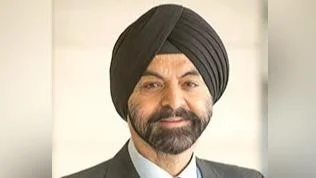The World Bank
Recent News About The World Bank
-
World Bank study highlights need for targeted support for rural women entrepreneurs
Subitha Banu, known as Bhai Amma, operates a small biryani stall in Erode, Tamil Nadu.
-
Report outlines strategies for empowering African adolescent girls
Amid increasing calls to invest in human capital and expand job opportunities for Africa's youth, a new report highlights the challenges faced by adolescent girls in the region.
-
World Bank supports Barbados' hurricane recovery with $54 million project
The World Bank has approved the Beryl Emergency Response and Recovery Project to aid Barbados in recovering from Hurricane Beryl.
-
Nepal partners with World Bank for $128 million road improvement project
The Government of Nepal and the World Bank have launched a $128 million project aimed at improving Nepal's provincial and local road network.
-
World Bank addresses tech-driven changes at Wuzhen Summit
Wencai Zhang, the Managing Director and Chief Administrative Officer of the World Bank Group, addressed the 2024 Wuzhen Summit at the Annual World Internet Conference.
-
World Bank supports educational continuity for millions of children in Sudan
A new initiative supported by the World Bank aims to maintain educational continuity for nearly four million students in Sudan.
-
World Bank outlines path for Viet Nam's economic growth towards high-income status
A new World Bank report, "Viet Nam 2045: Trading Up in a Changing World – Pathways to a High-Income Future," examines how Viet Nam can enhance its role in global value chains to achieve high-income status by 2045.
-
World Bank outlines strategies for enhancing Cambodia's transport connectivity
A recent report by the World Bank titled "Cambodia’s Regional Connectivity: Unlocking the Full Potential of Transport Corridors" highlights significant challenges in Cambodia's transport sector.
-
Yemen report highlights impact of conflict on climate resilience
The Yemen Country Climate and Development Report (CCDR) presents a comprehensive analysis of the challenges and opportunities posed by climate change in Yemen.
-
Bosnia urged to invest $6.8 billion against climate impacts
Bosnia and Herzegovina is urged to invest $6.8 billion over the next decade to safeguard its population, assets, and economy from the intensifying impacts of climate change.
-
Gambian women face hurdles in tourism despite high interest
Women in The Gambia's tourism sector face significant challenges, as highlighted by a recent gender assessment.
-
World Bank report highlights limited reach of economic inclusion programs
Economic inclusion programs are proving to be effective and economical, yet they currently reach only about 10% of the world's poorest populations, according to a report by the World Bank.
-
World Bank warns climate risks threaten up to 6% GDP loss annually in Djibouti
Increasing exposure to extreme weather events in Djibouti poses significant risks to both livelihoods and the nation's long-term economic growth, according to a report by the World Bank Group.
-
World Bank urges urgent climate investment amid Yemen's conflict challenges
Yemen, already struggling with the impacts of a prolonged conflict, is facing increasing threats from climate change.
-
Argentina explores aquaculture potential with World Bank-backed strategies
A recent World Bank analysis has highlighted the potential of Argentina's aquaculture sector, focusing on pacú, rainbow trout, and mussels.
-
Djibouti faces significant climate threats impacting its economy
Djibouti is confronting significant climate challenges that threaten its economy and infrastructure.
-
Guinea expands free healthcare access through new initiatives
Fatoumata Sow, a resident of Damakanian in Guinea, benefited from improved healthcare during her fourth pregnancy due to a community health center established in her village.
-
World Bank approves $1 billion support for Argentina's transport and energy sectors
The World Bank Board of Directors has approved two new projects for Argentina, aimed at enhancing public transport accessibility and improving the electricity subsidy system for residential users.
-
World Bank supports East Asia-Pacific development through extensive funding
The World Bank's International Development Association (IDA) has played a significant role in supporting low-income countries in the East Asia and Pacific (EAP) region for over sixty years.
-
G20 endorses roadmap for multilateral development bank reforms
The leaders of ten multilateral development banks (MDBs) have expressed their approval for the G20 Roadmap aimed at reforming these institutions to enhance their effectiveness.




















